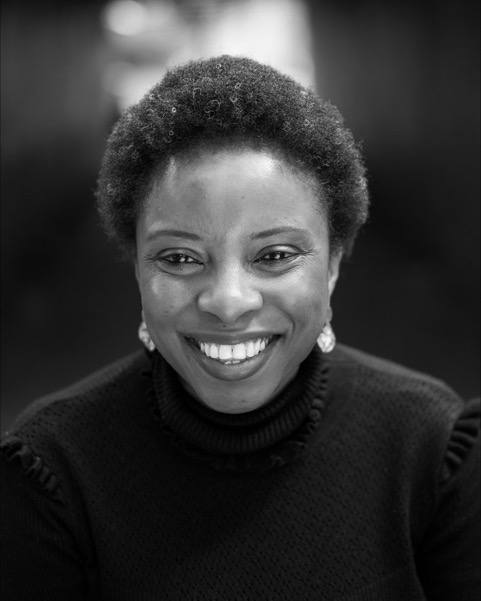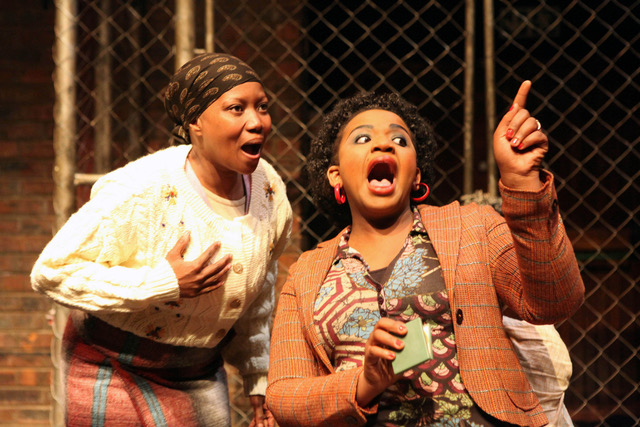Artistic Director of Utopia Theatre Mojisola Elufowoju talks about staging a series of online Rehearsed Readings

Courtesy of Smart Banda.
With theatre becoming increasingly more accessible to view online, this has opened up the possibility for cross cultural collaborations and audiences to watch performances they perhaps wouldn’t have been aware of before. Renowned for staging works showcasing the diversity of African culture, Artistic Director of Utopia Theatre Mojisola Elufowoju has introduced a season of rehearsed readings, each one off events taking place monthly, introducing to viewers a range of important African works. Ahead of the season’s second show ‘And the Girls in their Sunday Dresses’ by Zakes Mda, Mojisola tells us more about what inspired her to curate the shows chosen for the readings, how she’s approached creating work for the digital stage and what to expect from the season.
Hi, Mojisola, you’ve recently launched a series of online rehearsed readings, the first – ‘This is Our Chance’ took place on Sunday 17th January. How did the reading go?
The reading went really well. It was well attended. We had fantastic feedback. A lot of people commented that it gave them a “live theatre” experience which they’ve been missing.
Originally produced and directed in 2013 in collaboration with the James Ene Shaw Foundation, How have you found revisiting the play?
Having directed a large scale version of This Is Our Chance in Nigeria in 2013 with a cast of around 40 actors, dancers, musicians etc, it is fascinating to revisit the play through a digital medium. It was a completely different experience. Through this process I discovered there are so many beautiful plays gathering dust on bookshelves that can be brought to life through an online medium.
This is Our Chance witnessed 70 attendees view the show, what did this mean to have viewers from across the world access the show?
Utopia Theatre is a company based in Sheffield, South Yorkshire. To be able to engage with a worldwide audience is crucial. I feel that we have to be local to be relevant but at the same time, being able to reach a worldwide audience helps us to grow as an organisation and create international visibility for the artists we work with.
You’ll continue the series of one-off online readings from February to April with shows ‘And the Girls in their Sunday Dresses’, ‘The Black Hermit’and ‘Son of the Nile’. What inspired the selection of these plays?
Having studied a number of African classical plays during our Creative Hub initiative in the summer, I was inspired to get a sense of different writers from around the continent. ‘And The Girls in their Sunday dresses’was part of our African classics series online. It proved very popular with our audiences. I then thought how wonderful it would be to read a play from the North, South, East and the West of Africa. This Is Our Chance, the very first of the readings is from Nigeria, West Africa, ‘And The Girls In Their Sunday Dresses’is by Zakes Mda (28 February), South Africa. From North Africa we would be reading a play called ‘Son of the Nile: A Play for Young People’(25 April) and all those young at heart by Afeif Ismail and East African playwright Ngugi wa Thiongo’s play The Black Hermit (21 March).
What has the rehearsal and creative process involved for the shows and how have you found creating work for our digital age?
The process itself has been an opportunity for growth. Before covid19 the only interest I had in digital theatre was a plan to start to develop an archive of our productions online and to livestreaming our work to increase accessibility. It is an opportunity for us to explore other mediums to reach our audiences. For me Covid 19 has really opened my eyes. Nothing can replace live theatre but the play readings online has allowed us to experiment and see what does and doesn’t work before producing work for the future.
What are your hopes for the shows featured after the readings?
My hopes are that this break/opportunity to reflect gives all of us other ways of looking at how to create work. It has made me realise that the traditional ways of working are not the only way to work. I want to engage with and make work for real people, my community.
What can viewers expect from the series of readings?
They can expect them to be striving to push boundaries of online readings. They can expect something as close to live theatre as possible. They can expect to hear great plays that talk to the human condition that wouldn’t normally make it to mainstream theatre.

Courtesy of Ruphin Coudyzer ‘And The Girls In Their Sunday Dresses’ – Jul 2010
Questions by Lucy Basaba.
Mojisola Elufowoju is the CEO and Artistic Director of Utopia Theatre. A leading African Theatre company resident at Sheffield Crucible Theatre.
She was staff director at The National Theatre, working alongside Nadia Fall (Artistic Di-rector of the Royal Theatre Stratford East) on Three Sisters by Inua Ellams. She was a recipient of the 2017 Opera Awards Foundation bursary, a founding member of Mosaic Opera Collective, guest director at the London Academy of Dramatic Arts and at London South Bank University.
She is passionate about the growth and development of ethnic minorities in the theatre industry. Her work is to raise awareness and increase appreciation of African culture. She commissions new writing and presents established classics within a strong African context, and in so doing, dispelling stereotypes and encouraging authentic voices from the African diaspora.
She has recently launched a new initiative, Utopia Theatre Creative Hub, bringing African theatre experts together to offer courses, workshops and events online. The Creative Hub brings together some of the world’s leading African artists who share their own knowledge and experience through workshops and events as well as offering 1:1 sessions with artists. The programme is designed to support the development of a sustainable talent pool, give African Theatre practitioners greater visibility and inspire the next generation of artists, ultimately strengthening African communities within the Arts.
Other credits include: How Far Apart? (Work In Progress – Arcola Theatre and Sheffield Hallam Performance Lab 2019) Far Gone (Theatre Deli – Sheffield and Sheffield Theatre Studio 2019) The Bogus Woman (Camden People’s Theatre 2019), On Missing (The Cockpit Theatre 2018), Shadows In Different Shades (Work In Progress – Sheffield Thea-tre 2018), The Pied Piper Of Chibok Opera (Opera North Residency and Arcola Theatre 2018), I am David Oluwale (Work In Progress-Leeds Playhouse 2018), Iyalode of Eti (Leeds Playhouse, Sheffield Crucible, Cast – Doncaster and Ake Festival Nigeria 2016/2017) London Tales (Rich Mix and Lost Theatre 2015) This Is Our Chance (Cultural Centre Calabar, Nigeria 2013) The Shepherd’s Chameleon (CLF Art Cafe 2013) House of Corrections (Riverside Studios (2012) Wake Me When It’s Time (York Theatre Royal 2012).
 Info:
Info:
Utopia Theatre is proud to be able to continue the Rehearsed Readings through 2021, starting online and seeking to move the readings into theatre spaces when it is safe to do so.
Listings information
- 28 February 2021 – And the Girls in their Sunday Dresses by Zakes Mda
- 21 March 2021 – The Black Hermit by Ngugi wa Thiongo
- 25 April 2021 – Son of the Nile(a play for young people and all those young at heart) by Afeif Ismael
To book tickets, please visit here. Tickets are £6 for the livestream. Further productions will be announced later on in the year. To find out more and stay up to date with Utopia Theatre’s work, visit here…
On Sunday 28thFebruary, Utopia Theatre Company hosted their next rehearsed reading of the year, ‘And the Girls in their Sunday Dresses’ by Zakes Mda via Zoom. Introduced by Artistic Director Mojisola Elufowoju, it was expressed that there is a duty to show the diversity of Africa, and that plays from West, South, East and North Africa will be showcased within the following months. Dr Kene Igweonu followed with context about the show, written before the Apartheid’s end, shows during this time were prophetic, looking towards the future. The show was initially shown in the UK in 1988 at the Edinburgh Festival Fringe. Perfromed by Tatenda Naomi Matsvai who takes on the role of The Lady and Sabrina Richmond as The Woman, viewers watch on as the pair encapsulate the political landscape as they wait in line for food. The Lady’s resourcefulness and free nature contrasted with the Woman’s realism and determination highlight the voices of the unheard, the pair working brilliantly together to realise the reality of their situation. The evening ended with a Q & A session, informing us of the creative process in a new digitised normal.


Leave a Comment